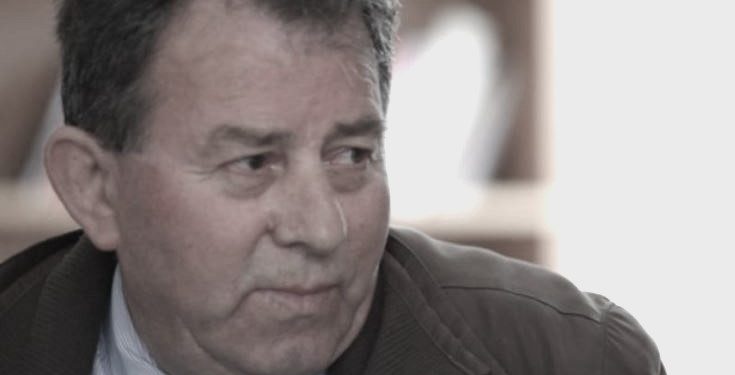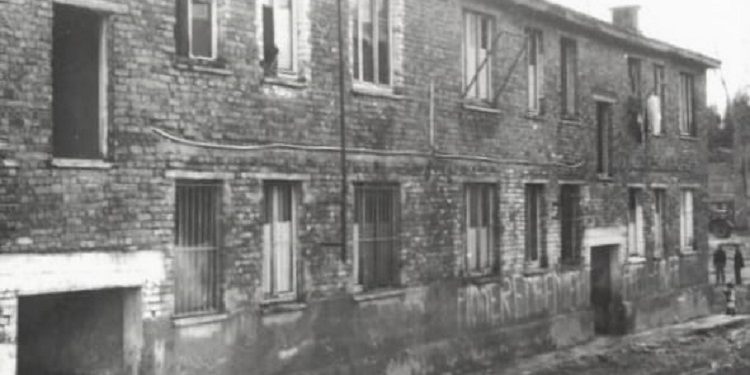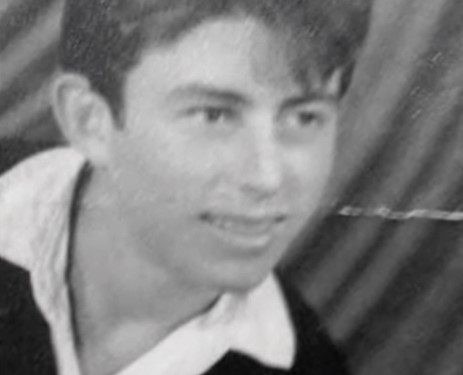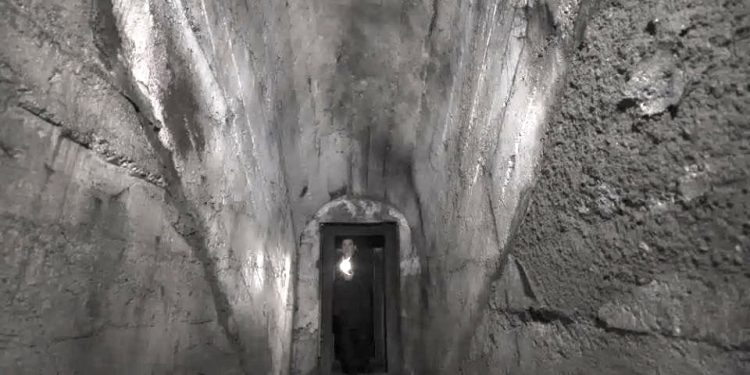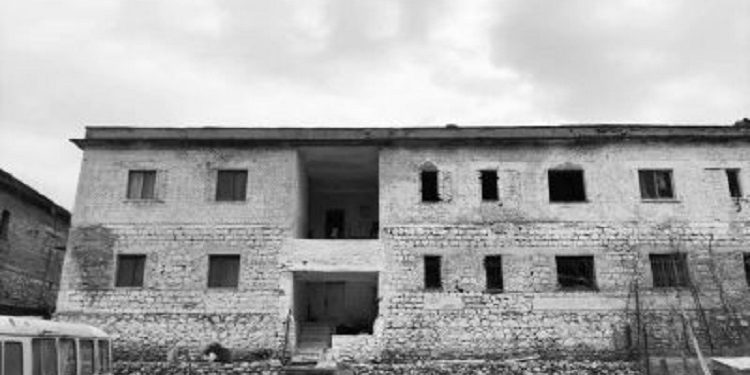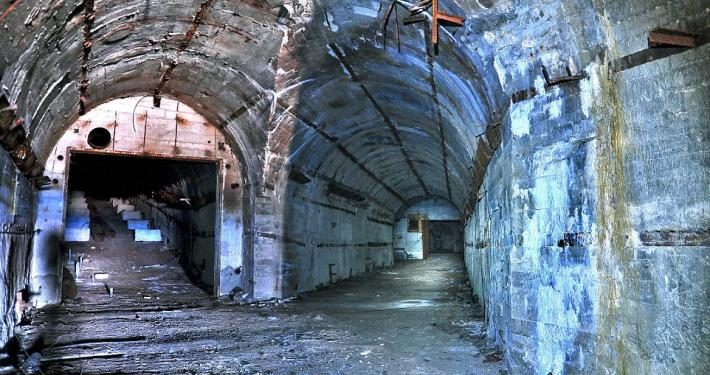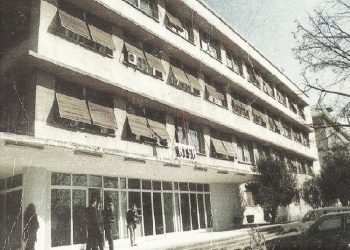By Shkëlqim Abazi
Part twenty-one
Memorie.al / I were born on December 23, 1951, in the dark month of a dark time, under the darkest communist regime. On September 23, 1968, the sadistic chief investigator, Llambi Gegeni, the ignorant investigator Shyqyri Çoku, and the cruel prosecutor Thoma Tutulani, butchered me at the Branch of Internal Affairs in Shkodra; they split my head open, blinded one of my eyes, deafened one of my ears, after they broke several of my ribs, half of my molars, and the thumb of my left hand. On October 23, 1968, they took me to court, where the wretch Faik Minarolli gave me a ten-year political prison sentence. After they cut my sentence in half because I was still a minor, sixteen years old, on November 23, 1968, they took me to the political camp of Reps, and from there, on September 23, 1970, to the Spaç camp, where on May 23, 1973, during the revolt of the political prisoners, four martyrs were sentenced to death and executed by firing squad: Pal Zefi, Skënder Daja, Hajri Pashaj, and Dervish Bejko.
On June 23, 2013, the Democratic Party lost the elections, a perfectly normal process in the democracy we claim to have. But on October 23, 2013, the General Director of the “reborn” government sent order No. 2203, dated 23.10.2013, for the dismissal of a police officer. So Divine Providence was intertwined with the neo-communist “reborn” Providence, and on the 23rd, they replaced me, no more and no less, with the former Security operative of the Burrel Prison. What could be more meaningful than that?! The former political prisoner is replaced by the former persecutor!
The Author
SHKËLQIM ABAZI
R E P S
(Forced Labor Camp)
Memoir
Curiosity to learn more about French and world literature was the first incentive, then the influence of my erudite friends, who stimulated my desire to read whatever I could get my hands on. They never missed an opportunity to talk to me and push me toward new and unknown things, and on the other hand, they would provide me with various books that were still abundant in the prisons at that time. So, I started reading whatever I could. Of course, the little knowledge I had was unsystematic, random, crude, and chaotic as I was getting it from books. To create the right order of necessary knowledge, deeper studies were needed. I had to find the right path. The old men, in agreement with the local intellectuals, made a kind of study schedule for me.
So, unexpectedly and without long thought, I started my studies where I had left them off. But now, I was no longer that diligent student with a bag full of books on my shoulder, sitting at a school desk, where we would follow professors who, from the podium, would narrate to us the histories of the Soviet Bolshevik Communist Party and the glorious October Revolution. I would no longer have the chance to listen to the stories about the villainies of a fourteen-year-old good-for-nothing, Pavel Morozov, who, without any remorse, handed his own father over to the Cheka, where he would end up executed by firing squad! And then the spy-boy would boast with the medal of the hero of the USSR (Union of Soviet Socialist Republics) on his chest, and would preach to us children of the Socialist Camp that he had done everything in the name of the triumph of the Bolshevik Communist Revolution, which would later incite his own uncle to execute him.
I would not be fed up with the fake heroism of a Soviet soldier who, all alone, held the front and faced an entire army of enemies! Nor with the supposedly Cultural-Proletarian Revolutions of the rice-eating type, nor with the sleepless Leifuners, who would collect nails fallen from the horses’ and mules’ hooves on the streets, so that they could later, supposedly, put them in the service of the world proletarian revolution. So, I had to revise what we had been taught backwards in school. To start from the beginning, with history distorted by class struggle, with literature cursed by the communists, with geography bitten by secret agreements, but also with the exact and social sciences, painting, music, and even physical culture, which was attributed to the lessons and directives of the Party and Comrade Enver. Thus, suddenly and unexpectedly, I found myself a student again!
But now, in a de-natural school. I was, perhaps, the strangest student in the world! Shaved-headed, like a member of a colony of vagabonds. But unlike them, I was brought among the elderly, dressed in a brown uniform, and had a white paper cap put on my head. I would hide the books in the barracks’ walls between the pupulit (a type of plaster), and the notebooks, I would cover under the cold ash of the hearths, whenever I suspected of sudden inspections, when any normal student would boast about the maintenance of their school equipment.
But even stranger still, would be my professors! Their hands, instead of chalk dust, would be blackened by pieces of coal and they would write on a piece of plywood that would replace the blackboard. With those worn-out clothes, without ties and without glasses, without bags and without a diary, without a register and without chairs, almost old people of retirement age, tired and exhausted, withered and paralyzed, some crippled with one hand or one leg; without exception, all of them hungry. These were my professors! But even the younger ones who were engaged in teaching were no better than the first. They would come to class after an exhausting day, with pickaxes and shovels.
Despite these miserable conditions, they took the task so seriously that you would think that at the end of the semester some evaluation committee would ask for their grades, because without record books, without grade registers, without progress evidence, they kept the relevant evaluations on some pasta packaging sheets, with the precision of pedants. At the end of the school year, semester, they had no report cards, nor commendation sheets, approved by the Ministry of Education, to stimulate the interest of their student; however, they put the painters in a competition, to see who would design the most beautiful one.
I will talk about this topic more extensively in a separate chapter. As long as I worked with the electricians, I felt well-treated. Gaqka the master, but also the assistant Maqua, respected me and sometimes tried to lighten my load. In special cases, the master would also assign me a small task that was related to the trade. After equipping me with pliers and screwdrivers, he would urge me to master the profession, because according to him, it would be useful to me in the future. But poor Gaqka would forget that no one cared for professionals, but for spies and seasoned lackeys of spies.
As I mentioned above, our brigade was a heterogeneous conglomeration. In its composition there were genuine specialists who were needed, but there was also a den for the seasoned spies of the dungeons. However, the overwhelming part was filled by the sick and the crippled, so they had given it the most meaningful name; they called it “The Brigade of the Weak” or “of the Cripples.” There I had the chance to meet some very interesting figures, who would serve me as positive and negative reference points, for my subsequent journey in prisons and in life. When my chisel happened to break or get dull, I would head to the blacksmith’s shop.
In a room next to ours, in a corner, they had installed a forge with a bellow, and on a thick plane tree stump, they had fixed an anvil. On one side, a workbench, with a drawer underneath it, where a dozen hammers and axes of different sizes, twisted pliers and tongs, large and small files were lined up in perfect order. So, a real workshop. I would enter the door, extend the chisel to the blacksmith, which he would take and plunge under the glowing embers. After he made the forge blow for about five minutes, the metal would redden, he would grab it with the twisted pliers and beat it on the anvil, sometimes with an axe and sometimes with a hammer, and as he filed it with the files placed in a row on the table, he would plunge it into a half-barrel of water, from which a smoky steam would rise. Hardened like that, he would return it to me without exchanging a word.
At that devil’s forge, only gestures were used, like in pantomime sketches. I was curious to hear the blacksmith’s voice, but he would lock himself in total silence, and I didn’t dare to speak to him. As every morning, one day I went to get the chisel that I had brought the day before, when I heard the blacksmith arguing. I froze at the door. He would raise and lower his voice and with a screeching sound, he seemed to be threatening someone. I could only see his back, but his scruffy figure looked very nervous.
“Oh-oh-oh, what you have been, oh my! Leeches, you hear me!” He would lower his voice a little, then start again more harshly. “What leeches, you wolves, dragons, you’ve been! Insatiable and breathless!” and all nerves, he would throw whatever he had in his hand in an undetermined direction. “All this I have done for you, and you are still not breathing! And now you’re teaching me the trade! Ptui, damn it!” – He would turn his head to the side, as if cursing. “Get out, you blockhead! You want to teach me how to do my job!” – he would stare at the red coal. “Come on, daddy, show me the fields! And who? You! Ptui-uu! I’ve been doing this for forty years, and I’ve never seen more misfortune than with you! You filth!” – he spat on the embers. “You don’t know what honor is!” – he threw a spitball toward the door, where I stood petrified: “Ptui! Evil seed!” I covered my face, so the splashes of spit would not fall on me. I looked around the blacksmith’s shop, to see who he was addressing.
No one was there. “Is he crazy?! Who is he arguing with, I wonder? Oh damn what a mess I’m in!” He extended his sooty nails with a grimace, as if he wanted to stab someone in the throat. “Ptui! Evil seed!” – he repeated all with anger and started pacing from one corner to the other. I understood, he was arguing with himself. “He really is crazy!” In order not to complicate the situation further, I bent down carefully, took the lever and turned back toward the work front. As soon as I grabbed the metal, his hoarse voice blasted by my ear: “Wait, kid, I haven’t finished yet!” The drops of spit spread on the back of my neck. “It doesn’t bother me, if you need to, bring it later!” and slowly, all eyes and ears, I moved toward the half-open door. “So, son, I have nothing to do with you! Sit down there, for five minutes, and it’s done!”
He snatched the piece of iron from my hand, plunged it under the glowing embers of the forge’s hearth. Despite my desire to leave a minute earlier, my legs were cut off. I remained nailed to the spot where I was. He, with a pair of twisted tongs, grabbed the chisel, took a file, and began the ritual. As I looked at that face blackened by the soot of the forge, I remembered the “iron mask,” of the mysterious man; on his harsh face, I could not decipher anything. While he was filing the tip of the chisel, his appearance began to change; his eyes seemed to soften; his hands went back and forth, with an almost mechanical ease. Somewhere, in the drooping corners of his lips, under the short-cut gray mustache, a secret smile was drawn; his expression sweetened like that of those mothers, when they caress the head of the baby they are feeding themselves. This sudden change caught me off guard:
“Oh God, what kind of machine-man is this?! He softened like a lamb! Where did all that poisonous grief go?! How did his eyes shine?! Who was he venting against?! Against himself! He must be crazy!” This ethereal deduction was gnawing at my brain. But I chose to remain silent! I didn’t want to scratch that gloomy landscape! The blacksmith seemed to have finished, because after he took the chisel out of the half-barrel of water, he put it down on the anvil. I reached out to take it. “Wait, kid, it’s still hot! Now I’ll make you another one, so you have it!” – he said, and with his head down, he went to a pile of scrap metal. He grabbed a piece of metal and was looking at it carefully, as if in doubt, whether it was suitable for what he had in mind to do, or if he should change it and take another one. It seemed he was convinced, because he turned and plunged it into the forge, filled a shovel with coal, and flattened it with the poker on the hearth of the fire.
“If one gets dull, you have the other one!” – he perhaps completed the sentence he had left unfinished earlier. Then he plopped down on a stool next to the door, as if exhausted, and took off his crumpled hat. Before me appeared a large bald head with angular shapes, a kind of “cornered-head.” “Where are you from, my boy?” – and, he passed his hand over his wide forehead a couple of times and took me in with his eyes. “Where, where did you say?” – His soft nasal voice surprised me. I didn’t expect him to talk to me, and even less with that warm tone. I hesitated, until I oriented myself: “From Berat!” – I returned lightly. “Where, where did you say?!” “From Berat!” – I repeated more loudly.
“Hah-a-ah, from Berat! By my honor, I have a friend in Berat! I don’t know if you know him, but in Albania, he is very well known! He was a sportsman, more precisely a boxer, they call him Ismail Ahmeti!” “Yes!” – I answered without hesitation. – “He was my professor!” “What did you say, man?” – he brought his cupped hand like a funnel to his earlobe. I understood, he had hearing problems. “Yes!” – I repeated in a louder tone. – “I knew him, he was my teacher!” “Where can he be now?” “In Berat, I believe! At least as far as I know!”
He fell silent. With his sooty fingers he scratched his bald head. I started to leave, but without taking two steps, I heard behind me: “Why did they put you in prison?” I went back inside, I told him the reason. “You did well; you can’t live with these dogs!” – He took a deep breath. – “They are worse than the Serbs!” – And he squeezed a handful of tobacco on a pipe like an owl’s head, grabbed the forked poker, and took a glowing coal from the hearth. He put it on the pipe and pressed it with his thumb. – “And I also wanted to help one of them, to escape to Italy, with a fabricated boat, with a pump-motor. But a spy appeared and told on me to the Security spies,” – he took a strong puff and filled his cheeks with smoke, after he held it in his mouth for a while; he started blowing it out in circles. –
“This is the third time I’ve been in prison. But, if I get out alive, I will run away again! Now he hid his big head in a halo of smoke. The tone was rising. Since he couldn’t hear himself, he thought that others had the same problem. I only knew him by face, I didn’t even know his name yet; I only knew he was Kosovar. I muttered a “thank you,” with the tip of my lips and left.
“What if he’s provoking me?! What if he’s playing a game and is going to harm me!” The very fact of being a part of this brigade made everyone suspicious and forced each one to be careful, even suspicious, of everyone. I turned my back. Without taking even two steps outside the door, the nasal voice followed me: “If you need the other one, come today, or tomorrow morning, and it’ll be ready!” I left, but the suspicion that a provocateur sent by the command might be hiding behind this stranger did not leave my mind. Before I even got my ladle of soup, when I returned to the camp, I asked Uncle Esheref about the mysterious man I had encountered. I briefly told him what happened and the conversation I had with the blacksmith.
“With who, man, with Qazim! What happened to him, man, he never speaks!” – My friend expressed his surprise. – “I’ve been his friend for so many years and I haven’t spoken so long! He’s a man of gold, he is! He’s the best among all the Kosovars! He’s been in prisons for a lifetime, he’s my old friend! As for a craftsman, he is his own peer! Look, all these tools, he made them for me! By God, he’s a good man! He’s a little grumpy, but someone must have wronged him for him to talk so long! Come on, kid, go eat! Now I’ll ask Qazim myself!”
I calmed down, with the bowl in my hand I approached the cauldron, took the cabbage and leek soup and slurped it on the side. Now after Uncle Esheref’s explanation, I felt calm, but a little guilty, that I had doubted the blacksmith. That same winter afternoon, Uncle Esheref and Qazim had a longer conversation than usual.
From that day on, Qazim Vula would join the ranks of my good friends. Now, after the guarantor Esheref Zajmi had broken the ice of distrust, I spoke freely with Qazim. One Sunday after I brought him coffee to his bed, I asked the blacksmith about the anger that had seized him and against whom he had vented all that rage, the day I went into the blacksmith’s shop.
This is what he confessed to me:
“We Albanians are a strange people, man! We have left all the good trades to the Gypsies! Look at them! Who is a blacksmith? – the Gypsy, who is a drummer? – the Gypsy, who sells and buys horses? – the Gypsy! The Gypsies make baskets and baskets, the Gypsies eat and drink and have fun, wallowing by the rivers and in the big bazaars. In the whole wide world, these trades are done by noble people, but with us and in the Balkans, they are done by Gypsies!
Since I was a child, my father had apprenticed me to a Bosnian’s shop, they worked with iron. I worked there for ten years. The Bosnian, since God had not blessed him with a son to pass on the trade to, put all his passion into me. He was a great engineer, even though he was uneducated. By God, he taught me the trade! At twenty years old, I opened my own shop! When the war started, I was in Prizren and Gjakova. Like all Kosovars, I was burning for the homeland. I turned my shops into arms workshops. In this way, I reached the year forty-five, making and repairing weapons for the freedom fighters.
When they shot at Miladin Popović, I had heard that the Serbian spies were surveying me, but I didn’t want to leave, I was married and had children who needed to eat. It didn’t take long and they put me in prison. From then on, my mind worked, only on how to escape. And one lucky day I managed to. I went straight to Albania! I didn’t know that Enver had Miladin as his spiritual father, or that Enver and Tito were so closely linked by friendship.
As soon as I set foot here, they put me in prison. But, by my honor, they sentenced me as an enemy of proletarian internationalism! When I finished my sentence, they sent me to internment, where I was even worse off than in prison. All those Kosovars who had escaped from the Serbs, they had gathered them in that place. I felt very weak! I couldn’t last long, in those conditions! I asked to leave Albania, to go to Europe, to work and earn some money, to raise my children.
No one was giving me Albanian citizenship, taking advantage of this; I made a request to leave the country, to Europe. The answer came quickly, after a week; they put me in prison again! Now, I was arrested, for spreading panic among the Kosovars and for attempting to escape from the internment place. Because I had left without permission until Fier, to post the letter. They brought me back to the camp. During all the time in prison, I worked as a blacksmith; it was the trade I knew how to do best. After they released me, they sent me, back to internment.
When I returned there again, there were even more interned Kosovars, than when they put me in prison. Now there were plenty of young men, who had escaped from Serbian terror. Among the young people who had arrived there, the Security had recruited as many as they needed to survey the others. To tell you the truth, I didn’t know them, but I was also very hard of hearing, as you see me now. I had the reputation of being a perfect mechanic; everyone knew that I could do anything with iron.
One of these young men asked me for help to escape; I fabricated a kind of boat, with some sheet metal barrels, to which I mounted a pump motor. We were ready, to launch into the sea. That very moment, I found myself arrested again. They had betrayed me again! They sentenced me and now I am here! I don’t know if I will get out alive anymore!”
The story with melancholy notes was one of the most common for where we were, but what was unusual, was the monotonous tone, with a dragged nasal voice. Completely different from the tone I heard in his blacksmith’s shop, with a high, harsh, and wild timbre, but the nasal accent was the same, perhaps a defect of his damaged ears. This time, the voice without nuances, flat and without ups and downs, was stroking the eardrum. It came out soft as silk, exactly the tone of old grandmothers, when they tell stories to put the little ones to sleep.
None of the three of us, who were sitting on the mattress, interrupted his colorless monologue. I became convinced that even if we had interrupted, Qazim would have continued his own, like a merciless prosecutor, who prosecutes old memories and gives them a capital punishment. After that, I was philosophizing about human nature, about the emotional burden of bad memories, which accumulate in a brain tired by daily stress; about the need every being feels to confess, to lighten the burden of sin.
Listening to the confession of that gloomy man, I came to an unknown conclusion: “For the soul to gain balance and to feel more in harmony with the world and the surrounding environment, it needs to vent, so that it can be reborn again; but to be renewed, it also needs one more effort: to release the rage, which layers like the pus of an abscess, which if its bed remains inside, can infect vital organs, and bring death. To maintain mental balance, the brain must be freed, just like that container under pressure that as soon as it reaches the peak, automatically opens the discharge valve blows the excess steam into the atmosphere and as it passes the risk of collapse; it returns to its primary function and enters the course of normalcy. Memorie.al




